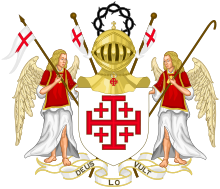Deus vult

Deus vult (Classical Latin for "God wills") is a Christian motto that has been used throughout the history of Western Christianity.[1] The phrase appears variously as Dieu le veut (French), Deus lo vult, etc.
It originates in Christian Bible as a declaration by Saint Paul: "Deus vult omnes homines salvos fieri,"—"God willeth all men to be saved."[2] Deus vult has appeared on the ecclesiastic seals of bishops of many Western Christian denominations;[1] it was also once woven with gold thread into the Pope's pallium.[1] Deus vult was used by the Crusaders as a battle cry at the declaration of the First Crusade by Pope Urban II at the Council of Clermont in 1095 when the Byzantine Empire requested help in defense from the Seljuk invasion of Anatolia.[3]
Deus lo vult is the motto of the Equestrian Order of the Holy Sepulchre of Jerusalem, a Roman Catholic order of chivalry.
Admiral Alfred Thayer Mahan, a Protestant Episcopalian, used the expression for his argument of "the dominion of Christ" as "essentially imperial" and that "Christianity and warfare" had a great deal in common: "'Deus vult!' say I. It was the cry of the Crusaders and of the Puritans and I doubt if man ever uttered a nobler [one]."[4]
The phrase has been occasionally used on social media by adherents of the alt-right movement since the mid-2010s. It has been among phrases spray-painted onto the walls of mosques in an act of vandalism, as well as by many individuals involved in memes.[5][6][7][8]
See also
- Churches Militant, Penitent, and Triumphant
- In hoc signo vinces
- Muscular Christianity
- Baruch Hashem
- Inshallah
References
- ^ a b c Casselman, Bill (18 September 2010). Where a Dobdob Meets a Dikdik: A Word Lover's Guide to the Weirdest, Wackiest, and Wonkiest Lexical Gems. Adams Media. pp. 123–124. ISBN 9781440510045.
{{cite book}}:|access-date=requires|url=(help) - ^ Jacobs, Henry Eyster; Schmauk, Theodore Emanuel (1888). The Lutheran Church Review, Volumes 7-8. Alumni Association of the Lutheran Theological Seminary. p. 266.
{{cite book}}:|access-date=requires|url=(help) - ^ Morwood, J: A Dictionary of Latin Words and Phrases, page 46. Oxford University Press, 1998
- ^ Alfred Thayer Mahan, "Some Neglected Aspects of War," 1907, in Unilateral Force in International Relations, (eds. Karsten, Peter, & Hunt, Richard N., Garland Publishing, New York & London, 1972), p 12.
- ^ Christopher Mathias (2016-10-21). "Two Arkansas Mosques Defaced With Racist, Islamophobic Graffiti". The Huffington Post.
- ^ Ishaan Tharoor (2016-11-16). "ISIS wants to fight a holy war. So do some Trump supporters". The Washington Post.
- ^ Noel K. Gallagher (2016-11-03). "Graffiti of Crusades' rallying cry investigated as possible hate crime at USM". Portland Press Herald.
- ^ Ashitha Nagesh (2016-12-17). "Vandals spray paint mosque with anti-Muslim slogans from the Crusades". The Metro.
External links
- . New International Encyclopedia. 1905.
